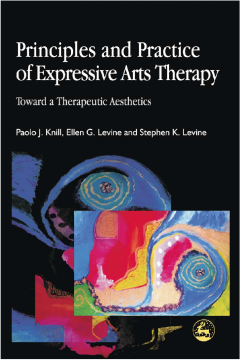
BOOK
Principles and Practice of Expressive Arts Therapy
Stephen K. Levine | Paolo J. Knill | Ellen G. Levine
(2004)
Additional Information
Book Details
Abstract
Challenging traditional therapeutic approaches to the arts in which art is often secondary to a psychological model, Principles and Practice of Expressive Arts Therapy provides a coherent theoretical framework for an expressive arts therapy practice that places the process of art-making and the art work itself at the center.
This book lays the philosophical foundation for a fresh interpretation of art-making and the therapeutic process by re-examining the concept of poiesis. The authors clarify the methodology and theory of practice with a focus on intermodal therapy, crystallization theory and polyaesthetics, and give guidance on the didactics of acquiring practical skills. Case studies of clinical practice and guidance on supervision and training in intermodal expressive arts therapy complement the theoretical chapters.
Combining philosophy, theory and practice, this book is an essential text for students and academics in the field and for practicing expressive and specialized arts therapists.
Principles and Practice of Expressive Arts Therapy has something for everyone, with a general trajectory leading from the abstract and esoteric to the practical and everyday.
Journal of the American Art Therapy Association
Laying out a philosophical, methodological, and practice-based thesis, Knill et al. give us a much-needed text that addresses the blended nature of the Expressive Arts Therapists. These are three masters in the field steeped in the language, education, and practice of arts-based psychotherapy.
The Arts in Psychotherapy
Paolo J. Knill is one of the founders of the expressive arts therapy program at Lesley University, USA and is the Provost of the European Graduate School (EGS) in Switzerland, which offers MA and PhD degrees in expressive arts therapy. Ellen G. Levine and Stephen K. Levine are co-founders of the ISIS-Canada training programme in expressive arts therapy. Ellen is the Dean of Independent Study in expressive arts therapy, education, and consulting at the EGS and Stephen is the Dean of the Doctoral Programme.
All three authors have published extensively in the field, with two of their works, Foundations of Expressive Arts Therapy and Poiesis, published by Jessica Kingsley Publishers.
Table of Contents
| Section Title | Page | Action | Price |
|---|---|---|---|
| Preface | |||
| Acknowledgments | |||
| Introduction | |||
| 1. Memory in the Contemporary World | |||
| 2. What Memories Are We Talking About? | |||
| 3. Political Struggles for Memory | |||
| 4. History and Social Memory | |||
| 5. Trauma, Testimony, and "Truth" | |||
| 6. Engendered Memories | |||
| 7. Transmissions, Legacies, Lessons | |||
| Conclusion | |||
| Appendix: A Chronology of Political Violence and Human Rights Movements | |||
| Notes | |||
| Works Cited | |||
| Index |
